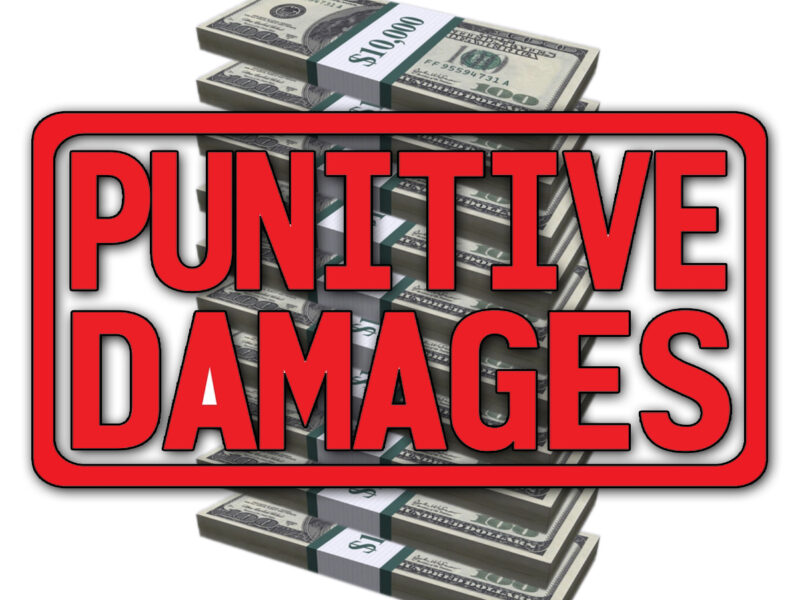When is a victim entitled to punitive damages?
You can recover punitive damages in a personal injury case if you can show that the defendant engaged in egregious misconduct. Punitive damages are meant to punish the defendant and deter similar conduct in the future. They are rarely awarded if the defendant was merely negligent. If you do get them, they are in addition to your compensatory damages.
What are punitive damages?
There are 2 types of damages that you can recover in a tort claim, or personal injury lawsuit:
- compensatory damages, and
- punitive damages, also known as exemplary damages.
Compensatory damages, also known as actual damages or special damages, aim to compensate you for your losses from the accident.
The purpose of punitive damages, though, is not to compensate you. Instead, it is to punish the defendant for its bad behavior. These damages also aim to deter similar behavior in the future.

When are they awarded in a personal injury case?
Punitive damages are rarely awarded in a personal injury case. Most personal injury claims demand compensation for injuries that resulted from an accident caused by the defendant’s negligence, like a car accident. It is generally considered unfair to punish a defendant for his or her negligence, even if it amounted to gross negligence. Imposing punitive damages also will not serve as a deterrence to negligent behavior.
However, there are times when the defendant acted so poorly that punitive damages can be warranted in a personal injury claim. For example, a motor vehicle accident caused by drunk driving can lead to an award of punitive damages. In these cases, the defendant’s actions can amount to recklessness for having a conscious disregard for your life.
Under California state law, punitive damages can be awarded if the injured party can show that the defendant acted with:
- malice,
- oppression, or
- fraud.1
You have to show this by clear and convincing evidence. This is a higher standard of proof than the normal burden that is used in personal injury claims: A preponderance of the evidence. This makes it more difficult to recover punitive damages.
The defendant’s bad behavior has to impact you, though. Punitive damages cannot be awarded in your claim for the defendant’s misconduct towards other people.
Nearly all awards of punitive damages come from a jury after a personal injury trial. Defendants hardly ever agree to pay punitive damages in a settlement. However, your settlement offer may be higher, as the defendant wants to avoid taking the case to trial and risking a punitive damage award.
Malicious conduct
Conduct is malicious if it was:
- done with an intent to cause injury, or
- despicable and was done with a willful and knowing disregard for your rights or safety.2
Conduct is despicable if reasonable people look down on it as:
- vile,
- base, or
- contemptible.3
People act with knowing disregard for someone else’s safety when they are aware of the likely dangerous consequences of their conduct, but deliberately fail to avoid them.4
Oppressive conduct
Defendants act with oppression if their conduct:
- was despicable, and
- subjected you to cruel and unjust hardship in knowing disregard for your rights.5
Fraud
Defendants commit fraud if they intentionally misrepresent or conceal a material fact in order to harm you.
Because this is intentional conduct, punitive damages may be warranted.

How big can punitive damage awards be?
Punitive damage awards can be very large. They depend on the defendant’s conduct, not on your losses or injuries. If the defendant behaved terribly, you may recover a significant punitive damage award even if your losses were not severe.
In California, there is no fixed formula for setting the amount of punitive damages. When setting the amount, juries consider the following factors:
- the reprehensibility of the defendant’s behavior, including whether it:
- caused physical harm,
- disregarded the health and safety of others,
- deliberately took advantage of your vulnerability or weak financial state,
- involved a pattern or practice of conduct, or
- involved trickery or deceit;
- whether there is a reasonable relationship between the amount of punitive damages and the harm that occurred or that was likely to occur, and
- whether the amount would deter the defendant’s future conduct, given the defendant’s financial condition or net worth.6
In many cases where they are awarded, punitive damages can exceed your amount of compensatory damages by as much as tenfold.7 Unlike in many other states, there is no statutory limit on punitive damage awards in California.
What are my compensatory damages?
Your compensatory damages are those that financially compensate you for your losses caused by the accident.
The bulk of your compensatory damages are for your medical bills and pain and suffering. However, you are also entitled to compensation for any professional setbacks from the accident, like lost wages. If you are disabled and cannot work in your former capacity, you can also recover compensation for your lost earnings. You can also recover compensation for property damage and any other loss that stemmed from the accident, like your emotional distress and any future medical expenses you are likely to accrue.
Your family can also be entitled to compensation for their loss of consortium.
How can a personal injury lawyer help me recover them?
A personal injury attorney from a reputable law firm can help you recover punitive damages by investigating your claim and searching for evidence of extreme wrongdoing by the defendant. Especially when the wrongdoer is a corporation, a pattern or practice of misconduct can be used to justify such damages. This is especially common in product liability or medical malpractice cases. Punitive damages are also more likely to be awarded in a wrongful death situation where a survival action is also filed.
An attorney can also let you know approximately how likely punitive damages could be in your case. This legal advice can help you make an informed decision about whether to settle your case, and for how much.
He or she can then advocate on your behalf at trial and present your best case for recovering punitive damages against the defendant.
Legal References:
- California Civil Jury Instructions (CACI) No. 3940 (individual defendant) and No. 3945 (entity defendant).
- Same.
- Same.
- Same.
- Same.
- Same.
- Nickerson v. Stonebridge Life Insurance, 161 Cal. Rptr. 3d. 629 (Cal. App. 2013).
